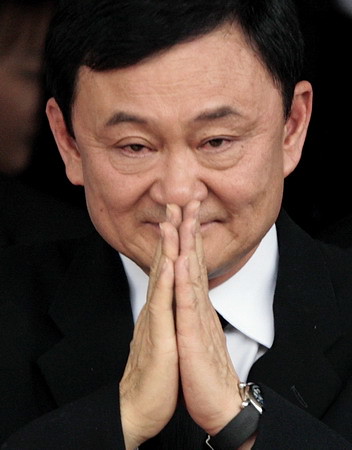By Pavin Chachavalpongpun, Fellow at the Institute of Southeast Asian Studies, Singapore.
Thailand, on 19 September 2010, marked the 4th anniversary of the military coup. While remembering the past, the pro-Thaksi n red-shirted members launched three-day demonstrations both in Bangkok and Chiangmai and demanded the Abhisit Vejjajiva government instigate economic and judicial reforms and release all political prisoners, including 17 core leaders of the United Front for Democracy against Dictatorship (UDD), the red-shirted political entity.
n red-shirted members launched three-day demonstrations both in Bangkok and Chiangmai and demanded the Abhisit Vejjajiva government instigate economic and judicial reforms and release all political prisoners, including 17 core leaders of the United Front for Democracy against Dictatorship (UDD), the red-shirted political entity.
The mood in Bangkok was tense as its residents learned about a new wave of red-shirted demonstrations. For them, it was too soon to forget about arson attacks against public property at the hands of the red shirts on 19 April this year. The return to the streets of the red-shirts, albeit peaceful and orderly, reminded the country of the existing gap between two different political ideologies. The gap has not been closed, thus allowing problems to periodically escalate.
In this context, what do the Thais learn from the military coup?
First, immediately after the military coup, General Sonthi Boonyaratglin, leader of the coup makers, announced, “Thai society has become polarised as never before, with mass confrontations between supporters and opponents of the former Prime Minister Thaksin Shinawatra threatening to turn violent”.
In reality however, the coup failed to fix Thailand’s political troubles. The military’s intervention in politics has further complicated the situation. Those in uniform were content to draw the faces of enemies in order to justify their role in politics, while adopting vicious tactics such as accusing their opponents of insulting certain institutions and thus posing a threat to national security. But the process of selecting enemies is often slippery and arbitrary. Was the military really fighting for the nation’s benefit as it claimed and not for its own narrow interest? And who indeed were enemies of the Thai nation?
Second, a question must be asked: Are Thai lives much safer today than during the Thaksin’s administration? The footage of Thai demonstrators using violence to achieve their political goals stood in stark contrast with the country’s make-believe image as a land of smiles and hospitality. In the May 2010 violent confrontation alone, 91 people were killed and nearly 2,000 injured. Recently, a series of bomb blasts has rocked Bangkok and some provinces. It is clear that since 2006, the use of violence has rapidly surged. It has gradually become a part of Thai political culture and a Thai way of political expression.
Lastly, in looking back over the past 4 years, has there been any new development in the Thai political domain? In many ways, Thailand has not changed much. The traditional elite are stilling holding on tightly to political power. Successfully overthrowing Thaksin who was perceived as a threat to their power position, the elite continue to fiercely safeguard the political status-quo and refuse to share power and wealth with the opposition.
Because Abhisit’s Democrat government has aligned itself so intimately with the traditional elite, its political agendas are frequently regarded as “suspicious and insincere” by the red-shirted supporters. The anti-government factions believed that Abhisit’s roadmap for national reconciliation was merely designed to delay serious political reforms and that he had no intention to call for an early election.
But the post-coup period is not only about political failure. Since September 2006, Thailand has witnessed increasingly active civil society organisations and pressure groups—they have brought about the rise of political activism. More rural residents have directly engaged in national politics. Some were willing to leave their farms behind to participate in the protests in Bangkok. This condition has paved the way for what I call “radical rural intellectuals” who think seriously about politics and society, their country’s problems and possible solutions.
They are now in a position to influence the public with their own thoughts about political affairs. “Being intellectual” is no longer an asset once strictly in a jealous possession of a tiny group of elite with status and privilege. These radical rural intellectuals, mostly in the working-class, have a burning enthusiasm in reshaping the future of Thai democracy and making Thailand a more equal society.
